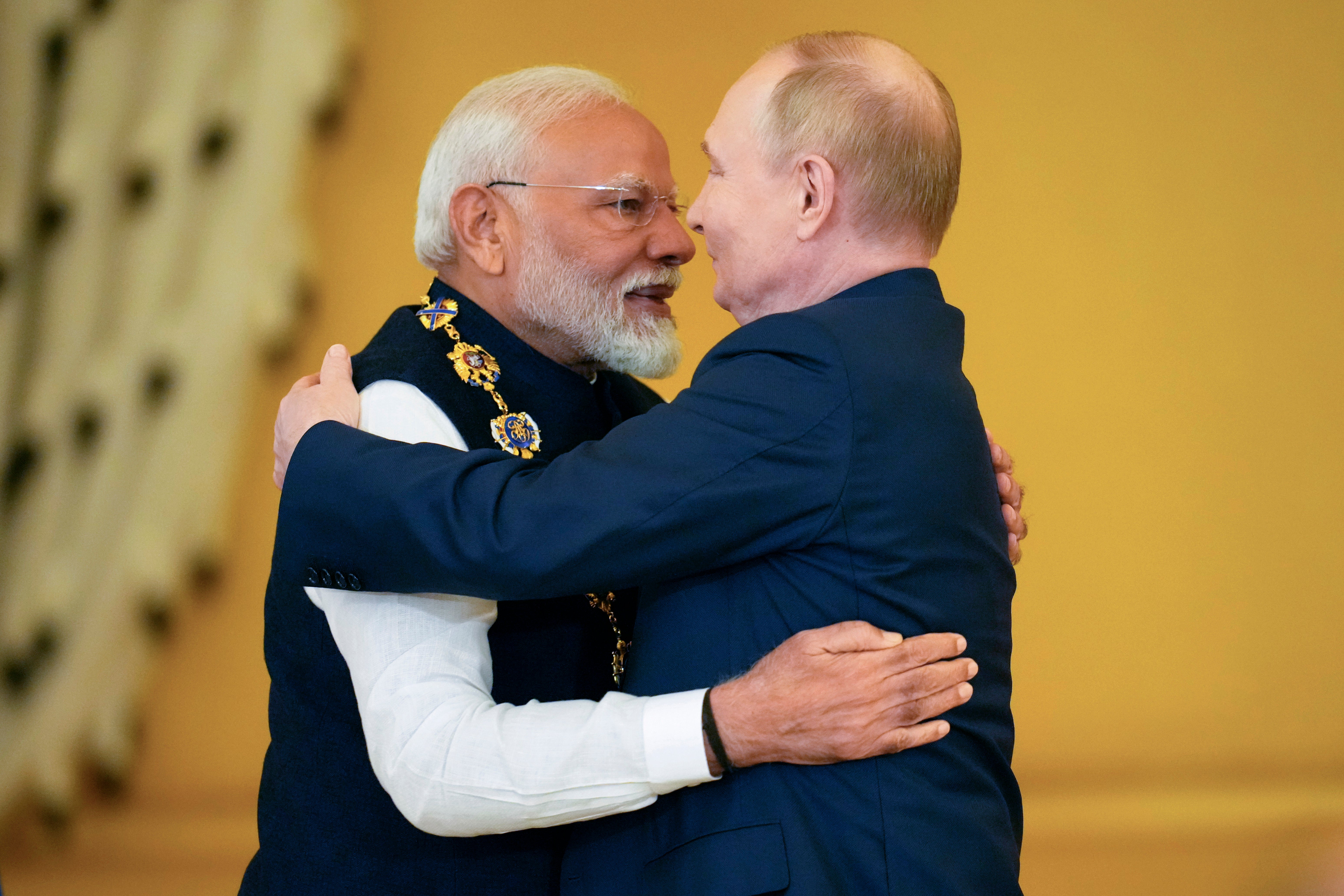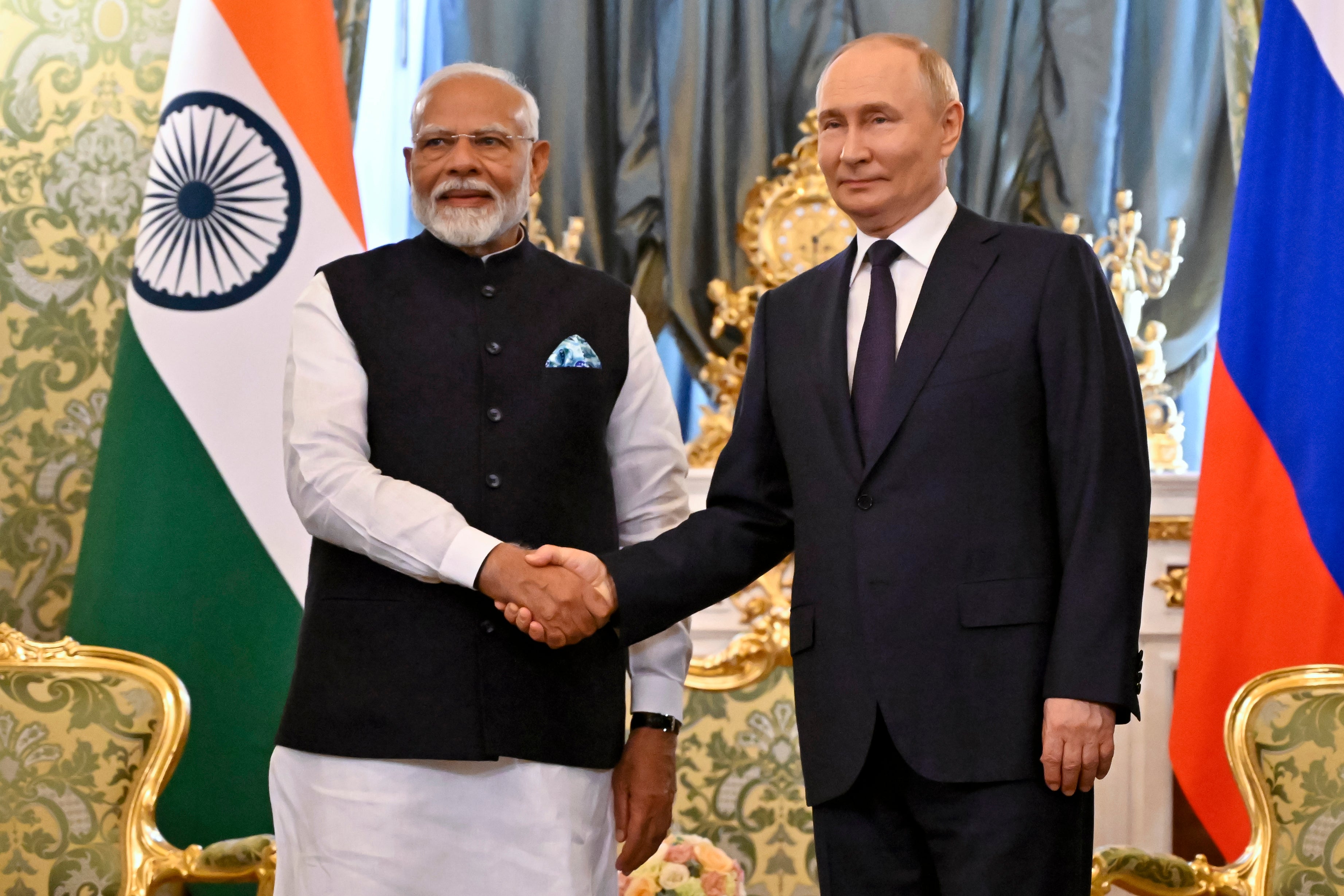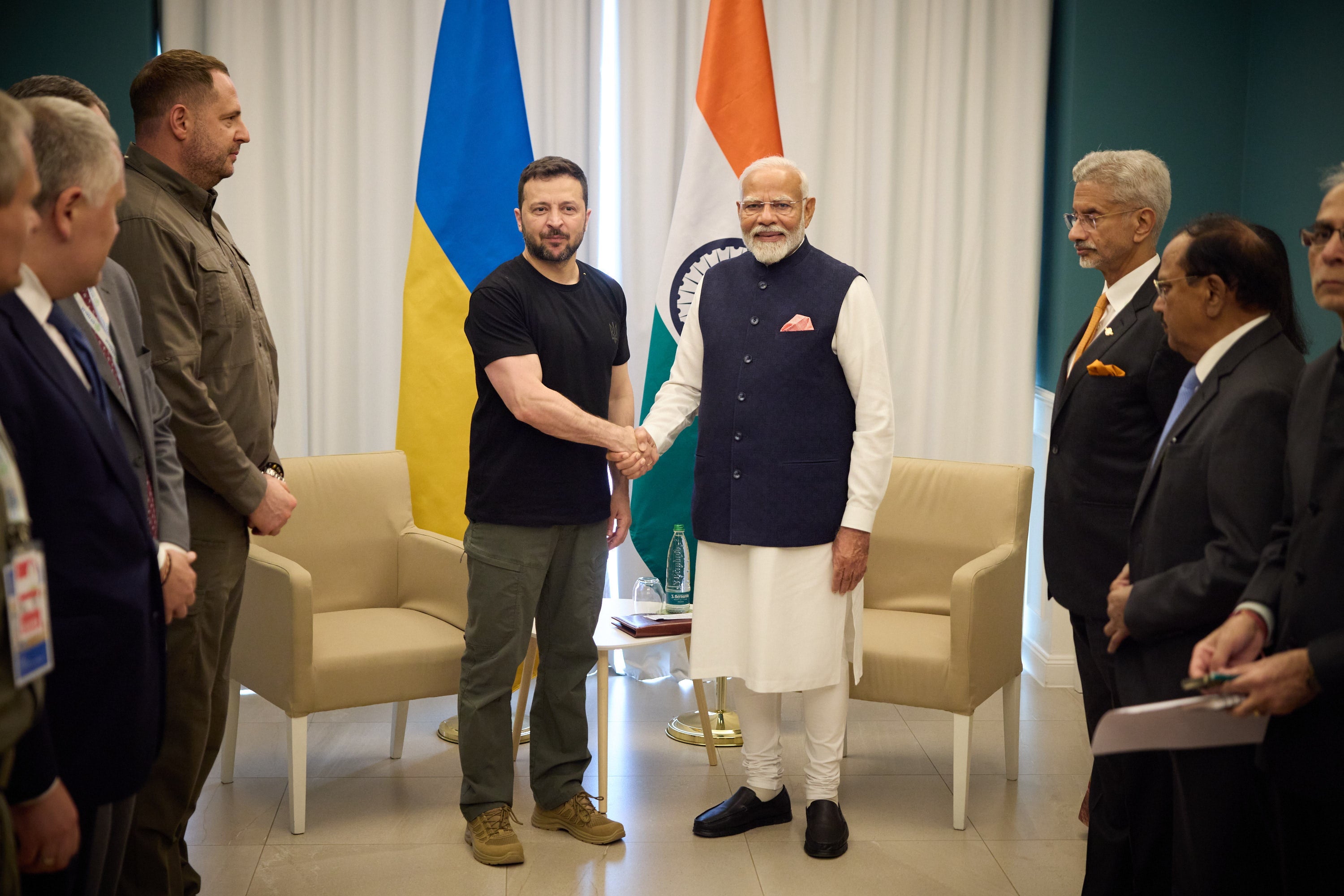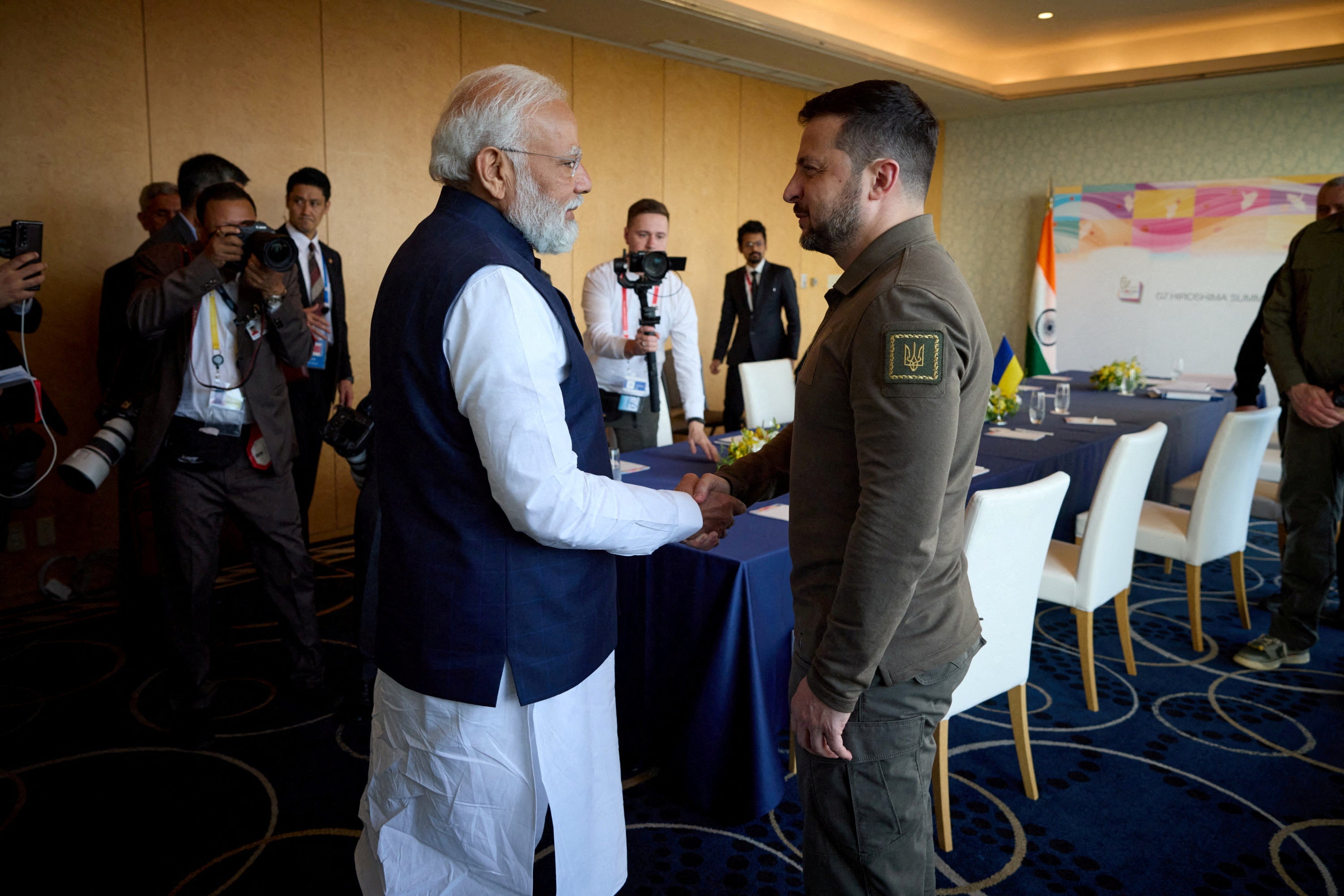Will Modi’s Ukraine visit change his mind on support for Russia’s Putin?
Analysis: Zelensky may try his hardest to convince the Indian prime minister of the folly of maintaining close ties with Moscow – but Modi shows no signs of giving up his balancing act
Your support helps us to tell the story
From reproductive rights to climate change to Big Tech, The Independent is on the ground when the story is developing. Whether it's investigating the financials of Elon Musk's pro-Trump PAC or producing our latest documentary, 'The A Word', which shines a light on the American women fighting for reproductive rights, we know how important it is to parse out the facts from the messaging.
At such a critical moment in US history, we need reporters on the ground. Your donation allows us to keep sending journalists to speak to both sides of the story.
The Independent is trusted by Americans across the entire political spectrum. And unlike many other quality news outlets, we choose not to lock Americans out of our reporting and analysis with paywalls. We believe quality journalism should be available to everyone, paid for by those who can afford it.
Your support makes all the difference.India has chosen to stay on the sidelines since its close ally Russia invaded Ukraine, dismissing pressure from Western nations to join in condemnation of Vladimir Putin’s war while still seeking deeper trade ties with the likes of the US and UK.
This tricky balancing act is one that prime minister Narendra Modi is expected to keep up during his visit to Kyiv, the first by an Indian prime minister since the two countries established diplomatic relations over 30 years ago.
Mr Modi arrived in Kyiv on Friday, having been in Poland on Thursday for the first leg of his Europe trip.
The timing of the visit, during which Mr Modi will meet president Volodymyr Zelensky, has not gone unnoticed: it coincides with Ukraine’s National Flag Day, commemorating its independence from the Soviet Union.
It also comes just over a month after the prime minister met Vladimir Putin in Moscow, inviting criticism from Western capitals as well as Mr Zelensky, who called it “a huge disappointment and a devastating blow to peace efforts to see the leader of the world’s largest democracy hug the world’s most bloody criminal on such a day”.
The same day Mr Modi and Mr Putin were meeting, Russian forces carried out missile strikes across Ukraine that reportedly killed at least 42 people.

Strategic observers say Mr Modi’s trip to Kyiv is aimed at reassuring India’s Western partners upset over his Moscow visit. And although it is mainly being undertaken for the sake of optics, the trip may present an opportunity for New Delhi to strengthen defence cooperation with Ukraine, which has been providing spare parts for its warships.
“Modi’s visit is primarily about providing reassurance to the West after the fallout of the Moscow visit, which coincided with the airstrikes in Ukraine ahead of the Nato summit,” Chietigj Bajpaee, a senior research fellow for South Asia at Chatham House, told The Independent.
“It’s a form of strategic signalling by India to the West and Europe in particular which has been more critical of India.”
Swaran Singh, professor of diplomacy and disarmament at the Jawaharlal Nehru University in Delhi, argues that Mr Modi’s trip is not an afterthought after his Moscow summit – but rather a way of India showing off its strategic autonomy.
“Western pressures are important but the decision is fundamentally driven by India’s foreign policy being built on the axis of strategic autonomy. And to demonstrate - even to Moscow – New Delhi will have a bear hug with Putin and we will also engage in Ukraine as well,” he told The Independent.
He also claimed that Mr Modi visiting Ukraine on the eve of its National Day was meant to send a message that “India stands with the independence of Ukraine”.

In any case, it won’t be easy for Mr Zelensky to sway India to his side against Russia. The Ukranian leadership’s limited engagement with New Delhi in the past has yielded no significant shift its position, which is largely driven by self-interest.
India relies heavily on Russia for weapons and energy supplies, to the point that New Delhi is accused by the West of indirectly funding Moscow’s war by buying vast quantities of Russian crude oil. These purchases have increased almost 20-fold since 2021.
Just before leaving for the trip, Mr Modi said he will "share perspectives" on a peaceful resolution of the war. “As a friend and partner, we hope for an early return of peace and stability in the region,” he said.
Delhi has previously indicated a willingness to give support to resolve the conflict peacefully, but hasn’t any plan, unlike rival China, which has proposed a 12-point peace plan.
“I am sceptical of India’s ability to play the role of a mediator as its self-interest in Russia raises questions about whether it has the means and motivation to play the role of some sort of mediator or peace builder, particularly given its long-standing and close relationship with Russia,” Mr Bajpaee said.
At most, he added, India could serve as a conduit to relay messages between Moscow and Kyiv and potentially offer a back channel for the West to communicate with Russia.

Rahul Roy-Chaudhury, a senior fellow at the International Institute for Strategic Studies in the UK, seemed to agree.
“Expectation of India playing a role in mediation is too exaggerated,” he said. “In my view, India has been able to do a balancing act between all these different parties. It has been able to do it reasonably successfully. But that is the extent. Mediation means going far beyond this.”
This could be because, Prof Singh said, India was wary of making a grand proposal, like China’s peace plan, that could fall flat on its face.
“India is being very cautious, very modest, very sublime. It is not making any grand proposals and any claims to do things as yet. I am also hopeful that a more definite wording will appear when Modi speaks in Kyiv,” he said.
Mr Chaudhury said the West could try and project Mr Modi’s visit to Mr Zelensky as a victory borne out of its pressure and criticism of his trip to Russia.
“Russia will understand that this is just for the optics and not much substance. And on India’s policy, there will be no substantive change in its ties with Moscow despite this visit to Ukraine,” he said.

At the same time, he pointed out, India could benefit by deepening defence trade with Kyiv. A number of Indian naval vessels rely on Ukrainian engines and spare parts, he explained.
If Moscow does object to Mr Modi’s visit, Mr Bajpaee said, it would manifest in other ways.
“Putin could deepen or grow outreach between Moscow and Pakistan, for instance,” he said.
In the worst-case scenario, Russia could lean more in China’s favour in its border conflict with India.




Join our commenting forum
Join thought-provoking conversations, follow other Independent readers and see their replies
Comments